Rio Grande (1950)
Directed by: John Ford
Written by: James Kevin McGuinness, James Warner Bellah
Starring: Ben Johnson, Claude Jarman Jr, John Wayne, Maureen O'Hara
USA
AVAILABLE ON BLU-RAY: 20TH APRIL, from EUREKA ENTERTAINMENT
RUNNING TIME: 105 mins
REVIEWED BY: Dr Lenera
It’s the summer of 1879, and Lieutenant Colonel Kirby Yorke is in charge of an outpost on the Texas frontier. He’s under considerable pressure due to the Apaches using Mexico as a sanctuary from pursuit, and by a serious shortage of troops in his command. Among his latest group of recruits is Travis Tyree, a fugitive from the law wanted for manslaughter, plus Kirby’s son Jefferson who he hasn’t seen in fifteen years. Jefferson wants to take on the Apaches and wishes to be treated just like any other soldier but his mother, Kirby’s estranged wife Kathleen, is against this. Then the Apaches attack….
I guess you could say that it’s the book’s fault. When I was young they used to constantly show westerns on TV, and I devoured them, until I read a certain tome called ‘Bury My Heart At Wounded Knee‘, which told of how the west was one from the side of the original inhabitants of North America who were virtually decimated. After that, I could no longer sit through many of those films where the whites were the good guys and the reds were the bad guys, films that were basically glorifying a vile lie. Of course there were still other westerns to enjoy, but even in recent years I have a similar opinion, which no doubt stops me from appreciating many fine films – and this is coming from someone who, as you’ll no doubt be aware if you’ve been reading me for long enough, detests political correctness and does his best to judge old movies by the standards of when they were made, not by the standards of today. However, I’ve gained considerably more appreciative of director John Ford in recent years, partly due to Eureka’s release of The Quiet Man [a film I loved so much I gave it a rare 10/10] and Arrow’s of My Darling Clementine, and partly due to my own purchases and viewings of the likes of The Searchers and The Man Who Shot Liberty Valance, so the time seemed right for me to give Rio Grande, the third of Ford’s ‘Cavalry’ trilogy which also consists of Fort Apache and She Wore A Yellow Ribbon, a go, courtesy of our friends at Eureka. Would I be able to properly judge and [hopefully] appreciate it as a film regardless of how abhorrent I found its political viewpoint? I was certainly willing to try. I partly succeeded, though I wouldn’t consider Rio Grande to be anywhere near a major work of Ford’s. Until its action-packed final half hour it’s a pleasant, breezy watch, more interested in personal drama than shooting up injuns, and with a very fine performance by John Wayne. But I still got wound up at times. What can I say? – at least I’m honest.
Ford was actually tired of making westerns by 1950 and had his heart set on filming The Quiet Man. However, Herbert Yates, the president of Republic Pictures, insisted that Ford make Rio Grande first with the same pairing of John Wayne and Maureen O’Hara because he thought the script of The Quiet Man was weak and that it would be a flop. The screenplay was written by James Kevin McGuinness, based on a short story entitled ‘Mission With No Record’ by James Warner Bellah that appeared in The Saturday Evening Post. Parts of the story loosely resemble a real-life expedition of the 4th Cavalry Regiment in Mexico, and may also have been influenced by the 1935 film Lives Of A Bengal Lancer which was set in the Indian Raj. The working title for the film was Rio Bravo [later pinched by Howard Hawks] and then Rio Grande Command. The budget was half of the production costs for Fort Apache and no one, Ford included, seemed to take the project very seriously on set. Shooting took place entirely on location in Moab, Utah [but not near the actual Rio Grande] during the extremely hot summer of 1950 where cast and crew struggled with the heat. According to O’ Hara, some stuntmen died when they fell from their horses during a scene in the middle of a muddy river. Their bodies were never recovered. The crew brought fifty Navajo Indians up from the nearest reservation to play Apaches. Billy Yellow, one of the ones selected for closeups, stated forty years later that the Navajo weren’t told that they were portraying Apache; if they had they wouldn’t have done it. Rio Grande was a hit – but The Quiet Man became an even bigger hit. Sadly McGuinness died just four weeks after the premiere. Wayne and O’ Hara would go on to star in not just The Quiet Man but The Wings of Eagles, plus the non-Ford McLintock! and Big Jake.
Wayne’s character is called Lt. Col. Kirby Yorke. He played a Capt. Kirby York in Fort Apache, so it’s tempting to see this film as a direct sequel to that one, though it’s probably just one of several examples where Ford confusingly reused character names. Kirby returns from a victorious battle with Indians to be told that his son whom he hasn’t seen for over a decade is one of a small number of recruits sent to the regiment, having flunked out of West Point but immediately enlisted as a private in the Army. Kirby asked for 180 men, but only gets eighteen. He demands that they make up for being such a low number. “If you fail, I’ll have you spreadeagled on a wagon wheel”. Jefferson doesn’t want to be treated any different and is soon brawling and doing daredevil horseback riding just like any good Cavalry Trooper, while his father keeps a distant watch on him. When his estranged wife Kathleen turns up to buy Jefferson out of his enlistment, Kirby initially acts similarly hard but finds it difficult. A nice touch is the possibility of the attention that Kathleen receives from younger soldiers being one thing that spurs him on to try to rekindle old passion. Eventually the Apaches attack the fort, and, while many of them are killed by the awakened soldiers, they succeed in freeing their leader, Natchez, who’d been captured earlier. Kirby’s superior, the real-life Commanding General of the Military Division of the Missouri Phillip Sheridan [who by the way is supposed to have said, “the only good Indian is a dead Indian”] orders him to cross the Rio Grande into Mexico in pursuit of the Apaches and kill them all, an action with serious political implications since it violates the sovereignty of another nation [nothing to do with contributing to the extermination of a tribe or their imprisonment in ‘reservations’ then?]. If he fails in his mission, he’ll have to face a court-martial.
Some Mexicans are encountered, but they’re no threat because, “Natchez and his band are the scourge of both your country and mine” [nothing to do with them being the original owners of the area then?]. The plentiful galloping, sneaking and shooting that follows is reasonably exciting in places with some great falls off horses, but the most potentially suspenseful sequence is almost thrown away by an unafraid young girl who won’t shut up, and the climax seems curiously unfinished. Of course the Indians, despite having rifles, often prefer to run towards where they can be easily shot dead by our Troopers. On the other hand the subplot of Travis Tyree, on the run because he killed a man and with a liking for stealing horses, is quite nicely woven into the narrative in the second half and its humorous aspects don’t intrude. It’s all just about involving enough to keep us going, but Ford does pad things out with loads of serenading from ‘The Regimental Singers’. Their tunes are decent, and sometimes relate to what’s going on with the characters, but some of the fifteen minutes or so of their singing would have been better taken up by giving us some of the dramatic beats that you think will come but which either don’t or are very muted. A subplot involving Kirby having burned Kathleen’s home down when he was a Union soldier is concluded – if you can call it that – in a bizarre way. It’s handed over to Kirby’s partner in the act, Sgt. Quincannon, who gets to really beat himself up over it and gets one of his hands whacked with a wooden beam for his troubles in a rather odd moment. Quincannon is played by Victor McLaglen who often provided comedy relief for Ford – well, comedy perhaps in inverted commas seeing as his mugging, often more for the camera than anybody who shares the screen with him, is an acquired taste. He gets a few good lines when answering back to mouthy Troopers, but a little of him can go a long way.
Then there’s Ford’s worship of the Cavalry. Serving in the Cavalry is some kind of Utopia for Real Men according to Ford and McGuinness, despite all those massacres of men, women and children that they carried out. The script goes as far as to tell us that the Cavalry are being held back by those wimps in government and their stupid rules from properly doing what they ought to be doing – killing all Indians who are nothing more than marauding savages. It’s all very well saying that this attitude was once the norm and should therefore be ignored when discussing older movies, but hang on a minute, this is 1950 – the very same year of Broken Arrow and Devil’s Doorway, two very pro-Indian westerns which both came out before this one. The so-called liberal [yet extremely militaristic] Ford may have mellowed in his views concerning America’s original inhabitants when he came to make The Searchers six years later, and later still publicly stated that he made Cheyenne Autumn as an apology for the way the Indians were treated in his movies, but the repellent romanticising of what was the entire subjection of a race, and largely through genocide, remains. However, despite the similarly unpleasantness of Wayne’s views on the subject, there’s no doubt that, if not at all a great actor, he was a good movie actor. Many of his best moments here are when he’s silent, his face showing that Kirby is torn between duty and family, and a man who needs family but has serious trouble knowing how to go about it. And, while generally considered to be of limited range, he wasn’t bad at all when doing love scenes, often coming across as sincere. He and O’ Hara almost seem to be in a warm-up for their wonderful coupling in The Quiet Man here, and are certainly good together.
Outside of Wayne and O’ Hara, Ben Johnson, already on his way to becoming a very familiar western face forever linked with the genre, makes a real impact as the laconically mischievous Travis, so much so that I wasn’t sure that I actually believed Travis when he told the story behind his crime, but on the other hand Claude Jarman Jr. as Jefferson makes so little impact that, as I type, I can barely remember his performance whatsoever. But all the main characters have many scenes where they are precisely placed within the frame to denote their relationships to each other, Ford being a master at doing this, while close-ups as usual being saved for special moments. Victor Young’s pleasant music score uses the lovely tune of the traditional song ‘I Will Come To Take You Home, Kathleen’ as the main theme and gives us some decent dramatic moments. And the Moab locations which actually fooled me into thinking I was seeing Monument Valley yet again until I read otherwise, provide both an imposing backdrop and a stark environment when necessary. Rio Grande has its virtues to be sure, but unless you really adore the genre it belongs to I would say that it’s quite hard to take for a first-time viewer unless you’re able to put its viewpoint to one side for its 105 minutes. I love a great many westerns, yet wasn’t able to enjoy this one anywhere near as much as I wanted. It’s probably my loss.
Rating: 









Eureka have given Rio Grande its best home viewing release. It was previously available on Blu-ray from North America’s Olive Films, and then in 2017 from A!ive in Germany, both containing just one featurette, but Eureka are using a much newer transfer so their version is no doubt better to look at. The image is sharp and clear, with blacks especially striking, and grain is well managed and natural. A few minor examples of print damage can be noticed if you look hard, but that of course can’t be helped.
While the A!ive disc contains a John Wayne documentary unavailable anywhere else, Eureka have included all the 2002 Artisan DVD special features and added two of their own. First up is the audio commentary by Stephen Prince and it’s excellent. He may sometimes describe what’s happening on screen but always adds observations on how it’s happening. We’re told that Kirby is partly based on Ford himself who had similar problems juggling family and other things, that clever angles disguise when the same locales are being passed repeatedly, and that the MPAA demanded some anti-Indian dialogue be removed. Prince clearly admires the film and Ford, though is able to go into the treatment of the Indians without being too critical of it. I wish I had his restraint. This track is followed by O’ Hara’s commentary from the DVD. She does leave big gaps which get longer, and towards the end resorts to mostly praising everyone, but there’s still a lot of great stuff, from a scruffy Ford not being let into where she was making another film so he could ask her to be in this one and O’ Hara’s hilarious response, to a large hole in the ground being dug and covered in a wet canvas roof for her to rest during the arduous shoot, to there always being somebody who’d angered Ford so was ghen subjected to his nastiness for a day. Ford actually sounds very unpleasant, though O’ Hara still speaks of him with affection. Together the two tracks provide a good picture of the movie and its making, with hardly any overlap either.
The new video essay by Tag Gallagher is shorter and less enlightening than we’ve come to expect, but gives us some historical background to the film’s events and points out its main motifs and devices. The final two pieces date from the DVD. A typically cheery and un-critical Leonard Maltin hosts a brisk making of and appreciation, along with the likes of Johnson and Harry Carey, Jr. who offer a few more nuggets unheard of previously on the disc, such as the unusual way that Johnson got a pay rise and contract with Ford. There’s obviously some repeated information, but less than you might expect. Then finally we get Along the Rio Grande with Maureen O’Hara which takes us back to Moab and has the lady offer much the same reminisces as she did in her commentary, along with the likes of Victor’s son Andrew V. McLaglen who discusses his father. These last two pieces are quite ‘fluffy’, and O’ Hara sidesteps politics by saying how we should forgive past injustices and just all try to get along, but they add still extra flavour.
A fine release of a film I had major problems with yet still found just about enough good stuff to almost compensate. Many others think it’s a classic, so maybe it is if you’re able to ignore its politics which I sadly wasn’t. So overall this release is Recommended with Reservations.
SPECIAL FEATURES
*Limited Edition O-Card [2000 units]
*1080p presentation on Blu-ray, from a new transfer completed by Paramount’s preservation department in 2019
*Optional English subtitles for the deaf and hard-of-hearing
*Brand new and exclusive feature-length audio commentary by western authority Stephen Prince
*Scene specific audio commentary with Maureen O’Hara
*A video essay on the film by John Ford expert and scholar Tag Gallagher [10 mins]
*The Making of Rio Grande – archival featurette [21 mins]
*Along the Rio Grande with Maureen O’Hara – archival documentary [19 mins]
*Theatrical trailer
*A collector’s booklet featuring a new essay by western expert Howard Hughes; a new essay by film writer Phil Hoad; transcript of an interview with John Ford; excerpts from a conversation with Harry Carey, Jr.

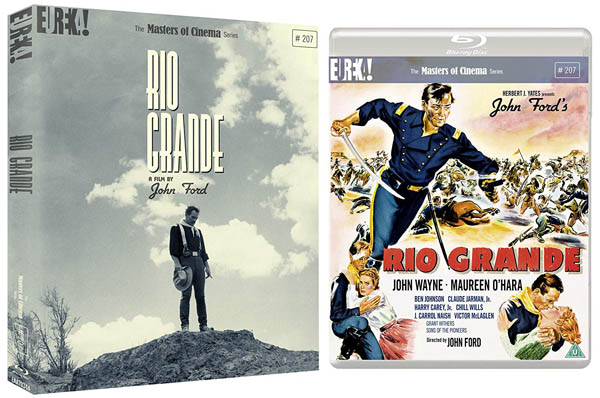
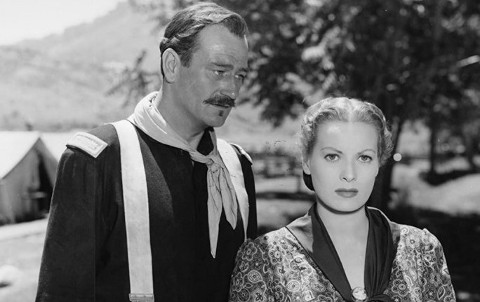
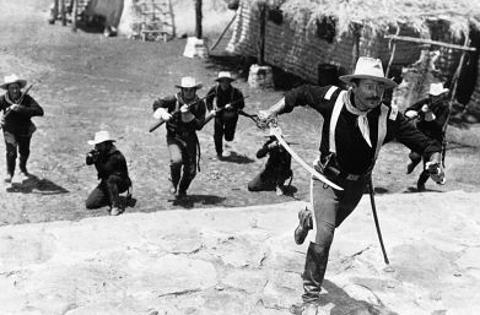

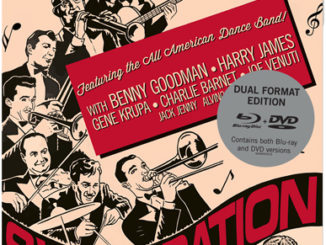
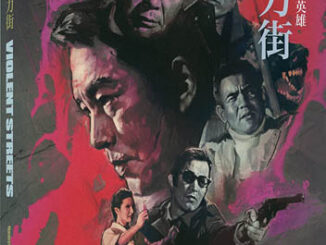
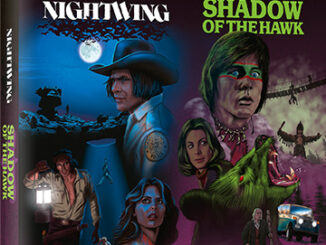
Be the first to comment